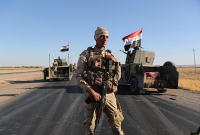Support strong Canadian climate journalism for 2025
An idyllic estate on the shore of Meech Lake outside Ottawa will be the scene Thursday when representatives from more than a dozen countries gather to discuss the war against the Islamic State group and the futures of Iraq and Syria.
The meeting, co-hosted by Defence Minister Harjit Sajjan and his American counterpart James Mattis, comes as Canada weighs its own role in the region, where the Islamic State of Iraq and the Levant remains a threat despite its battlefield defeats.
A recent U.S. Defense Department report that said while ISIL has lost nearly all the territory it once controlled in Iraq, it has started to dig roots as an "effective" insurgent group — and that it could take "years, if not decades" before the Iraqi military can deal with it on its own.
Canada earlier this year assumed command of a NATO training mission that includes 250 Canadian troops and whose aim is to train the Iraqi military so that it can ensure security and defend against threats such as ISIL.
But hundreds of other Canadian soldiers not assigned to the training mission have continued to fly transport and refuelling aircraft, collect and analyze intelligence and provide medical assistance to coalition efforts against ISIL, also known as ISIS.
That aspect of the mission is set to expire in March, and the question going into Thursday's meeting is whether the federal government will opt to keep those troops in Iraq, change their mission or begin to take them out of the country.
"We want to be a responsible coalition partner," Sajjan said Wednesday when asked whether the government will extend the mission in Iraq. "We're doing the proper analysis and we'll adjust with the situation."
The Meech Lake meeting will involve representatives from 13 countries leading the fight against ISIL, whose capture of large swathes of Iraq and Syria in 2014 and brutal tactics resulted in a massive U.S.-led military intervention involving dozens of countries.
Canada initially deployed a handful of special-forces soldiers to help the Kurds in northern Iraq defend against further ISIL incursions in September 2014, before adding fighter jets, surveillance and refuelling aircraft and more troops.
The mission, now in its fifth year, has evolved numerous times. That includes the Liberal government's decision to withdraw Canadian fighter jets from the region in 2016 and a shift from training Kurdish forces to helping the Iraqi military.
The Liberal government has given military commanders permission to deploy up to 850 Canadian Forces members to the region, though a military spokeswoman could not say Wednesday how many are on the ground now.
The U.S.-led coalition against ISIL says the extremist group has lost all the territory it held in Iraq and still holds less than one per cent of the land it once occupied in Syria.
"Great progress has been made. Daesh now does not control any territory," Sajjan said Wednesday. "Now we need to make sure that we focus on the capacity-building and the training."
Yet a report released by the U.S. Defense Department's lead inspector general for overseas contingency operations last month warned that "an effective clandestine ISIS organization appears to be taking hold in both countries."
Iraq's deserts and mountains were found to have made it hard for the Iraqi military to oust the last ISIL remnants, it added, allowing the group to continue attacks against Iraqi forces, local community leaders and the country's power grid.
That, in turn, has weakened public confidence in the Iraqi government and military, which is already low amid anger and protests over a lack of water, electricity and jobs as corruption and political instability in Baghdad have slowed post-ISIL recovery.
Political, ethnic and religious divisions, as well as competing interests among various foreign actors such as the U.S. and Iran, have posed significant challenges to stabilization and reconstruction over the past year.
Yet while Canada and others have turned their efforts to train the Iraqi military from fighting on the battlefield to counter-insurgency, the report quoted the U.S. Defense Department as warning that it could take "years, if not decades" for the Iraqis to become self-reliant.
"Systemic weaknesses remain, many of which are the same deficiencies that enabled the rise of ISIS in 2014," the report reads.
The assessment raises questions about how long U.S. forces will need to remain in the country, it adds, "since the goal of that mission is defined as the 'enduring defeat' of ISIS."
— With files from Terry Pedwell





Comments